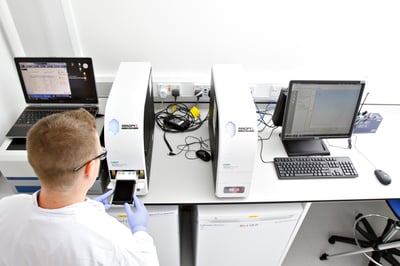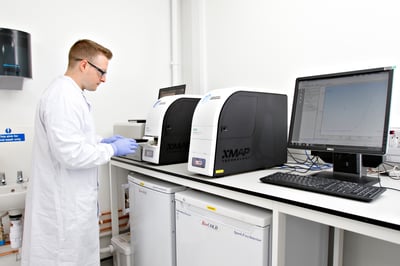Platform Technologies: Explant culture and Microphysiological systems
Our scientists offer a range of fresh explant cultures that can be customized to suit your requirements. By using patient-derived explants (PDE) that reflect human biology, we can retain phenotypic relevance and maximize throughput per donor. Throughput per donor varies depending on the tissue type but can be as high as 20-24 for skin explants or higher still for precision-cut lung slices (PCLS). These microphysiological systems are cultured for up to seven days, allowing a range of functional endpoints to be measured, such as cytokine or chemokine production, gene expression, and immunohistochemistry.
These microphysiological systems use healthy or diseased biospecimens ethically sourced from patients with psoriasis, inflammatory bowel disease, and COPD. When combined with the analysis of up to 50 analytes per well, testing your compounds in human fresh tissues provides powerful data in a cost-effective manner.

Endpoint analysis for microphysiological systems
By combining multiplex immunoassays with our ethical access to human fresh healthy and diseased tissue samples, REPROCELL offers a unique service based on the Bio-Plex Immunoassay system, which is capable of reading up to 50 analytes per sample.
The measurement of analytes such as growth factors, chemokines, or cytokines released from tissue samples can be a powerful pharmacodynamic experiment, particularly in diseased biospecimins. Our Luminex platform provides a sensitive measurement of a wide range of analytes and is compatible with multiplex kits from several manufactures including Bio-Rad, Life Technologies, and Millipore.

Precision Cut Lung Slice (PCLS) Assays
PCLS assays retain the structural and functional integrity of lung tissue to offer phenotypically accurate microphysiological systems for lung behavior. This model can be used to measure a variety of endpoints such as structural integrity, tissue viability, or biomarker release. By comparing animal and human data, the translation of preclinical animal data into human clinical information can be assessed. Typical workflow for a PCLS project. Other human tissues can also be prepared as slices, such as liver.

Diagram showing the setup of our PCLS assays.
Skin Disease Models
Fresh human skin is cultured in media and a psoriasis-like phenotype is induced using a proprietary cocktail of compounds and test compounds are applied in order to test their ability to reduce inflammation. After stimulation of the Th17 pathway, the inhibition of inflammation by potential new drugs is assessed by determining the release of cytokines, such as IL-17 or IL-22, using a Luminex assay.

Diagram showing the setup of our ex vivo skin culture assays.